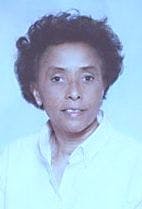Women’s March salutes Reconstruction-era activist
Jan 21, 2015
Story
Mary Ann Shadd Cary
Edited by Carolyn Bennett
Mary Ann Shadd Cary “enjoyed the sport of debate and banter,” Jane Rhodes writes in a biography of this pioneering woman, “and she rarely hesitated to strike back at rivals and enemies” — qualities admired in men and scorned in women, thus making Mary Ann Shadd Cary a controversial figure.
She was a quintessential dissident. A woman whose life was marked by transgressions of the boundaries of sex, color and class; and the price she paid for her audacity.
Part of a remarkable family of freeborn African Americans, Mary Ann Shadd Cary, an activist, integrationist, educator, journalist and attorney, devoted her life to fighting racism and inequality in North America. Her ancestry is a narrative of American racial history traced to the founding of the nation, a story of the early meeting of black and white. The results, a mixed racial family heritage contradicting ideologies of racial purity that underpin legally sanctioned segregation and discrimination.
By the end of the 1840s, Mary Ann Shadd had carved a path that directed her activities for a lifetime. “Teaching was always an important part of her identity and the way she earned her living, but writing and public expression became increasingly important as a means of having a political voice.”
Contempt for clergy, churches
“‘Aside from their caste character, their influence on colored people is fatal,’” Rhodes quotes Shadd Cary. “‘The character of the exclusive church in Canada tends to perpetuate ignorance, both in their true positions as British subjects, and of the Christian religion in its purity.’”
Questioning philanthropy
Is it “‘really a benevolent act to send old almanacs, old novels, and all manner of obsolete books’ to the fugitives?” she challenged.
Is it not “vanity [that] motivates benefactors to empty ‘useless contents of old libraries’ so that they [benefactors] might congratulate themselves for their selfishness. ‘Why not give, when gifts are needed, that which is useful.’
Appreciation for free press
Mary Ann Shadd Cary developed a great appreciation for the power of the press. The day after she closed her school in Windsor, Ontario, March 24, 1853, she began publishing the Provincial Freeman newspaper.
Fervent feminist
Mary Ann Shadd Cary developed a political ideology that bridged her early nationalism with an increasingly militant feminism.
Her politics during the latter part of her life took root in dual quests for racial and gender justice. Mary Ann Shadd Cary called for a gender-inclusive racial politics, a platform on which women’s rights were in the foreground of racial discrimination.
Sources and notes
Mary Ann Shadd Cary was a North American who resided for considerable periods in the United States and Canada. She was a nineteenth century political activist, educator, lawyer, integrationist, and writer, journalist. (b.1823, d. 1893)
Mary Ann Shadd Cary was born in Wilmington, Delaware, and at age ten, she moved with her family to West Chester, Pennsylvania, and attended Quaker schools. After teaching school in Wilmington then New York City and Norristown, Pennsylvania, she emigrated from the United States to Canada.
In Windsor, she established an integrated school at Canada West and from there began writing and publishing her ideas on self-reliance.
In 1842, she published “Notes on Canada West,” a 44-page pamphlet promoting Black immigration to Canada. After writing, publishing and teaching in Canada, Shadd Cary returned to the United States. Settling in Washington, D.C., in 1863, she founded another school, studied law and graduated with a degree in law from Howard University.
She opened her law practice in Washington and resumed political activism, once challenging the House Judiciary Committee for voting rights, winning her case, and becoming one of the few women who voted in federal elections during Reconstruction.
Through the Colored Women’s Progressive Franchise Association she founded in 1880, Mary Ann Shadd Cary campaigned for women’s rights and encouraged Black women to address their specific political and economic condition and to fight for equal rights and opportunities.
Mary Ann Shadd Cary: The Black Press and protest in the nineteenth century (Jane Rhodes), Indiana University Press, 1998
Black Women in America: An historical encyclopedia (eds. Hine, Brown, Terborg-Penn), Indiana University Press, 1993
Bennett's books available in New York State independent bookstores: Lift Bridge Bookshop: www.liftbridgebooks.com [Brockport, NY]; Sundance Books: http://www.sundancebooks.com/main.html [Geneseo, NY]; The Book Den, Ltd.: BookDenLtd@frontiernet.net [Danville, NY]; Talking Leaves Books-Elmwood: talking.leaves.elmwood@gmail.com [Buffalo, NY]; Book House of Stuyvesant Plaza: http://www.bhny.com/ [Albany, NY]; Mood Makers Books: www.moodmakersbooks.com [City of Rochester, NY]; Dog Ears Bookstore and Literary Arts Center: www.enlightenthedog.org/ [Buffalo, NY]; Burlingham Books – ‘Your Local Chapter’: http://burlinghambooks.com/ [Perry, NY 14530]; The Bookworm: http://www.eabookworm.com/ [East Aurora, NY]; LONGS’ Cards and Books: http://longscardsandbooks.com/ [Penn Yan, NY]
Posted by Bennett's Study at 8:33 PM




